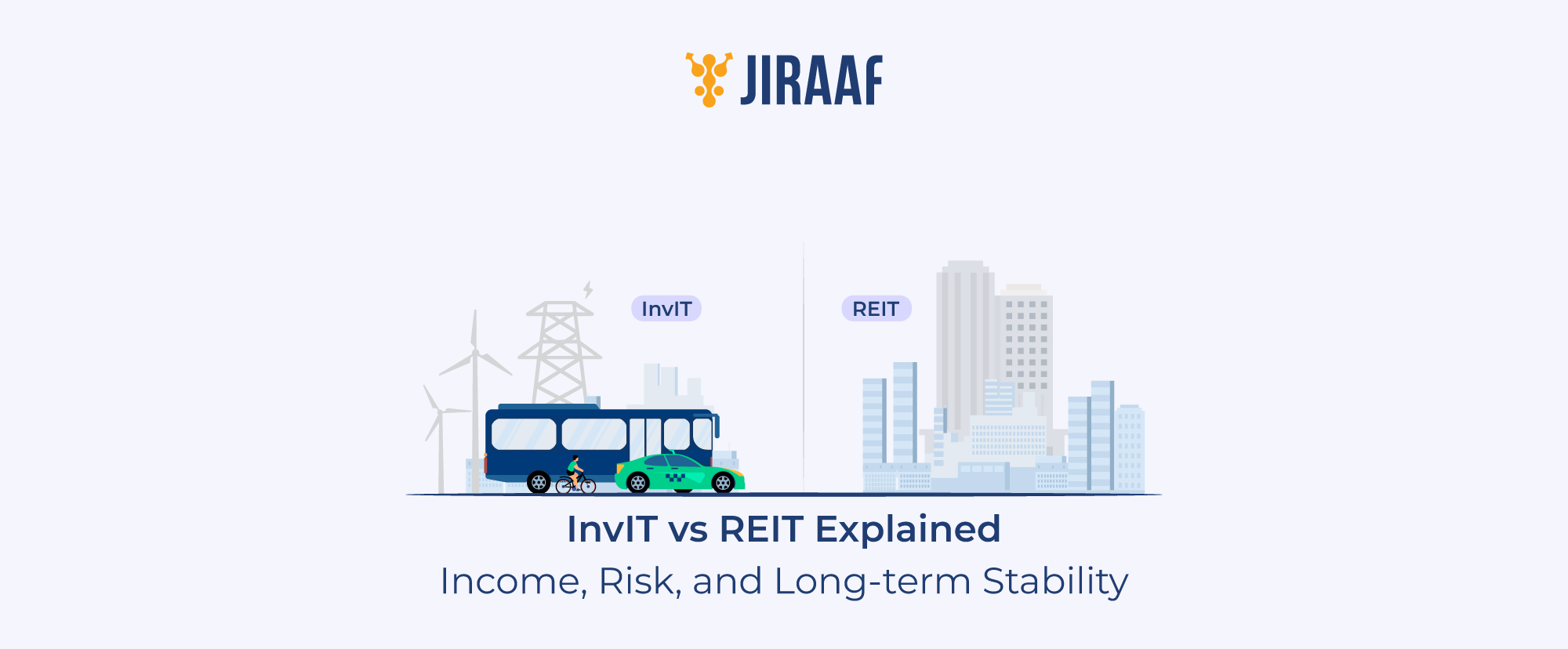Real estate investing has long been regarded as an indication of financial progress, but the truth is more nuanced. Many people are hesitant to start because of the hefty costs to enter, legal paperwork, and continuous inconvenience of property management. The goal of owning real estate that generates revenue frequently seems unattainable to the majority.
That’s where Real Estate Investment Trusts (REITs) make a difference. They let you invest in premium commercial properties—think office buildings, shopping malls, or warehouses—without the burden of direct ownership. It’s comparatively an easier way to enter the real estate market with a modest investment, the flexibility of stock market trading, and clear insights into your holdings.
But how exactly do these REITs work, and why are they becoming so popular in India and abroad? Let’s dive deeper to understand their structure, types, benefits, and the risks that come with them.
What is a Real Estate Investment Trust (REIT)?
A Real Estate Investment Trust is a trust that owns and manages income-generating commercial real estate—like offices, malls, or warehouses—and passes at least 90% of its profits to you, the investor, as dividends.
Think of it as a mutual fund for real estate, pooling money from individuals and institutions to invest in high-value properties without you having to buy them outright. Now, let’s see how these trusts actually work in action.
How do REITs Work?
Here’s a simple breakdown of how REITs work:
- You transfer the real estate assets to a trust, which then lists on the NSE/BSE via an initial public offering (IPO).
- The REIT earns dividends, rents, and interest from its underlying assets and special purpose vehicles (SPVs).
- At least 90% of the net cash flow goes to the unitholders.
- When you sell your units, you get dividends, interest income, and capital gains.
Understanding how REITs function sets the stage for the next big question: what kinds of REITs are out there, and how do they differ?
Types of REITs You Can Invest In
There are three major classes of REITs that you can invest in:
- Equity REITs: Own and manage the physical properties for rental income.
- Mortgage REITs: Invest in securities backed by mortgages to generate interest.
- Hybrid REITs: Combining the two techniques gives you a mix of rentals and interest income.
- India has created Small and Medium REITs (SM-REITs), which target smaller assets of 50–500 crores.
Now that we’ve explored the different types of REITs, the next question is obvious: why should you consider investing in them? Looking at the benefits not only answers the ‘why’ but also helps clarify who they’re best suited for.
Benefits of Investing in REITs
- Passive income: REITs offer regular dividend payouts—typically 6-9%yield—with distribution mandated quarterly or semi-annually.
- Liquidity: Like stocks, REIT units are traded on NSE/BSE. Trading minimums are now 1 unit, and minimum investment is around ₹10000–15000.
- Diversification: REITs give you access to a portfolio of real estate across regions and segments, without putting in a large capital.
- Transparency & regulations: SEBI regulates disclosure, payouts, and minimum asset requirements (80% in income assets), ensuring accountability and your protection.
- Professional management: Your investment is handled by knowledgeable asset managers and trustees—a passive approach to real estate.
Now that we’ve seen the benefits, the next natural question is how do you invest in REITs in India?
How to Invest in REITs in India (or globally)?
Here’s how you can start:
- Start with the basics: To invest in REITs, you’ll first need a Demat and trading account, along with completing your KYC formalities. This gives you access to buy and hold REIT units just like shares.
- Explore your options: In India, some of the listed REITs you can consider are Mindspace Business Parks, Brookfield India REIT, and Embassy Office Parks. Comparing their portfolio mix, occupancy levels, and past performance can help you choose wisely.
- Ways to invest: To invest in REITs, you can purchase units through an initial public offering (IPO) when a new REIT hits the market or buy them on exchanges like NSE or BSE during trading hours. Thanks to SEBI’s 2024 regulations, a single unit for SM-REITs starts at just ₹10,000–₹15,000, offering an affordable way for individual investors to step into real estate.
- Keep track of performance: After you have invested in a REIT, keep a check on how it’s performing by looking at things like occupancy rates, dividend payouts, net asset value (NAV), and quarterly reports. These details help you understand if your investment is on the right track and growing strong.
- Indirect exposure: If you don’t want to pick individual REITs, you can still gain exposure by investing in REIT-focused mutual funds or exchange-traded funds (ETFs). These give you diversification across multiple real estate assets in India or abroad.
Now that you’ve got the hang of investing in REITs, it’s equally important to take a moment to consider the risks involved. Knowing these from the start will guide you to make smarter, more informed choices and steer clear of unexpected challenges.
Risks and Limitations of REITs
- Market & rental volatility: Vacancies and tenant defaults can reduce your income, impacting the dividend earnings.
- Complex taxation: Dividends, interest, capital gains, and debt amortization all have different taxation systems.
- Interest rate sensitivity: Rising rates can dampen prices as REIT yields compete with bonds in the market.
- Limited options: Currently, only 3 major listed REITs exist in India. This considerably limits your options and may make REITs a less liquid alternative on stock exchanges.
- Property vacancy: One of the most significant hazards that REITs face is vacancy. The pandemic and widespread adoption of remote work have only contributed to this problem. With some IT firms looking to embrace work-from-home as a more permanent solution, you should consider the occupancy of the REIT’s properties as well as the average lease length before making an investment choice.
Since REITs let you tap into real estate, it’s natural to compare them with buying property directly. But the two aren’t the same—let’s break down how they differ so you can clearly see what each brings to the table.
REITs vs Direct Real Estate Investment
| Feature | REITs | Direct Real Estate |
| Liquidity | High (listed units). | Low (property sale; time-consuming). |
| Diversification | Across multiple sectors and assets. | Dispersed exposure is tougher. |
| Cost | ₹10,000–15,000 minimum. | Costs tens of lakhs to millions. |
| Management | Professionally handled. | Requires your active efforts. |
| Regulation | SEBI governed. | Only property laws and local bodies. |
If you want convenience, liquidity, and diversification, REITs are ideal. Direct real estate provides control and possible appreciation but comes with the responsibility of property ownership.
Conclusion
With REITs, you may invest in real estate while still having the ease and liquidity of stock investments. Without having to deal with landlords, maintenance, or large investments, you may own an interest in premium commercial properties, earn steady income, and possibly generate financial gains.
As long as you are aware of the dangers, such as shifting interest rates or difficulties in the rental market, REITs may be a good complement to your assets if you value steady income, a diverse property portfolio, and expert management. Start with a little investment, do your homework thoroughly, and make sure your objectives line up with the changing real estate market.









